Can I Put Premium Gas in My Car? Expert Guide
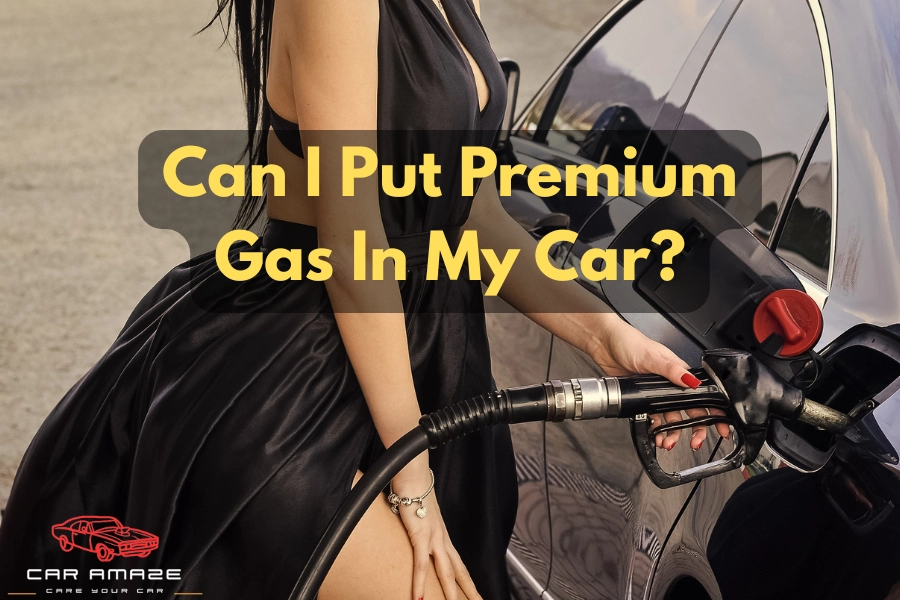
While filling up the gas in the car, you have two options: premium gas and regular gas. But the question is, can I put premium gas in my car? Many drivers think that premium fuel might make their car faster, smoother, and cleaner. As an automotive expert, I have seen this question come up, and the answer is that not every car is made for premium gas. It is only required for some engines that need higher octane ratings. In this article, I will explain everything about premium gas in easy terms.
Quick Answer: Is It Okay to Use Premium Gas in a Regular Car? 📄
Yes, you can put premium gas in your car, but it’s usually not necessary unless your vehicle’s engine requires it. Premium fuel (91–93 octane) is designed for high-performance or turbocharged engines that need higher octane levels to prevent knocking. For regular cars, using premium gas won’t improve speed, power, or fuel economy—it just costs more with no added benefits. Always check your owner’s manual to know which fuel type your car truly needs.
Table of contents
- What Is Premium Gas?
- Can I Put Premium Gas in My Car? Expert Opinion
- Premium Gas in Regular Cars: Myths and Things to Know
- How to Check What Gas to Put in Your Regular Car
- Conclusion
- FAQs
What Is Premium Gas?
Normally, we see three types of fuels at gas stations, including Regular (87 octane), Mid-grade (89 octane), and Premium (91 or 93 octane). The octane number, which is also called the octane rating, measures how well the fuel can resist knocking or pinging inside the engine. Here is the overview of these octane numbers:
- Regular gas (87): Works perfectly for most standard engines.
- Mid-grade (89): It has a slightly higher octane option, which is also suitable for standard engines.
- Premium gas (91–93): The premium gas is best for high-performance or turbocharged engines that have higher compression ratios.
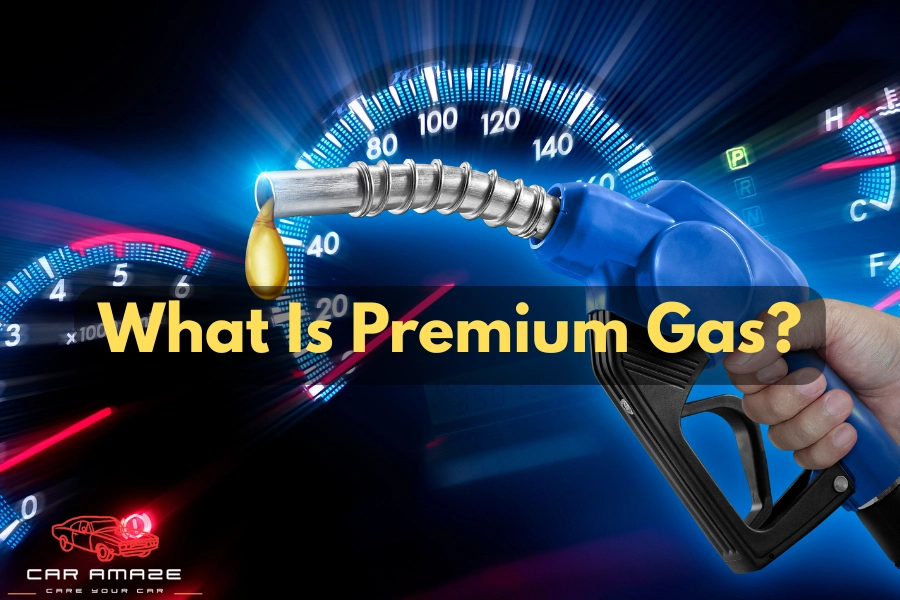
Why Is Premium Gas Called ‘Premium,’ and How Does It Work?
The premium gas can handle more pressure before burning due to the high octane number. This is useful for engines that work harder and produce more heat. The normal cars with low-power engines do not require that extra protection. So, if you have a question about whether you can put a premium in your car, the answer is that it depends on your car’s engine power. Here are some key aspects about premium gas:
- You can put premium gas in cars with engines that compress air and fuel more tightly.
- It helps prevent early fuel ignition, also known as engine knock.
- It is required in sports cars, turbocharged engines, and luxury vehicles.
So, the premium fuel does not give a magical performance boost. You can simply put premium gas in your car if the engine is made for hard work or high performance. Whether the car has the engine in the back or front, the premium gas option depends on the engine power and type.
Can I Put Premium Gas in My Car? Expert Opinion
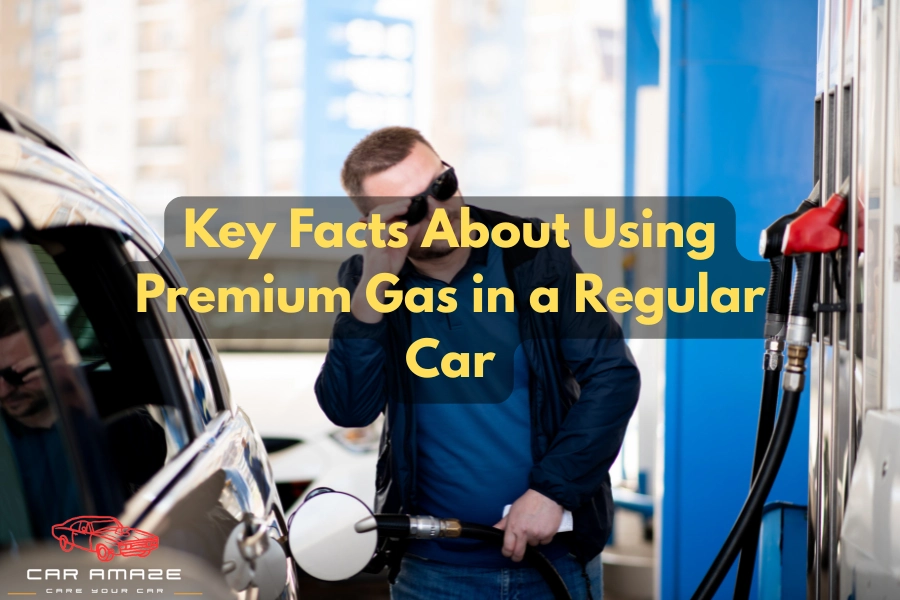
Yes, you can put premium gas in your car, and nothing bad will happen. If you put super premium in your regular car, there will be no issue like car overheating, engine stalling, car hesitation, or any other.
However, the thing to notice is that you will not see any benefits of premium gas in your regular car. In short, you can use premium gas in your regular car, but it is not recommended because there will be no benefit. You will just waste some extra money on premium gas.
Why Premium Gas Will Not Increase Performance?
The engine and sensors of your normal car are already designed to burn 87 octane fuel efficiently. Using premium 91-93 octane gas will make your car faster, cleaner, or more powerful. So, high-octane fuel is normally not recommended for regular cars. You will only spend more money at the pump.
What Happens If You Fill Premium Gas in a Regular Car Occasionally?
If you fill up with premium gas unintentionally or due to an emergency, you do not have to worry. It is perfectly fine, and it will not hurt your car’s engine. But if you put premium gas in your car without any emergency, you are just giving extra cash for nothing.
Can I Put Premium Gas in My Unleaded Car?
There is another common query: Can you put premium gas in your unleaded car? The answer is simple: yes, and it is safe. But do you know the truth that all gasoline sold today is unleaded? Lead was removed from fuels decades ago because it was harmful to engines and the environment. Therefore, if you see the “unleaded” label, it simply means any regular, mid-grade, or premium fuel at the pump.
Can I Mix Premium and Regular Gas?
The answer is that mixing premium and regular gas will not affect the regular car. Your car will run using the average octane level. For example:
Half a tank of 87 (regular) + half a tank of 91 (premium) = around 89 octane.
In comparison, if your car engine is made for hard work or high performance, mixing premium and regular gas will cause issues. If there is a mix of regular gas and premium, the octane level will be lower, and the car will not work at its best.
Premium Gas in Regular Cars: Myths and Things to Know
Before deciding which gas to use in your car, there are some additional things you should know. Here is the overview of premium gas mileage, when to use it, myths, pros and cons, and the effect on the engine:
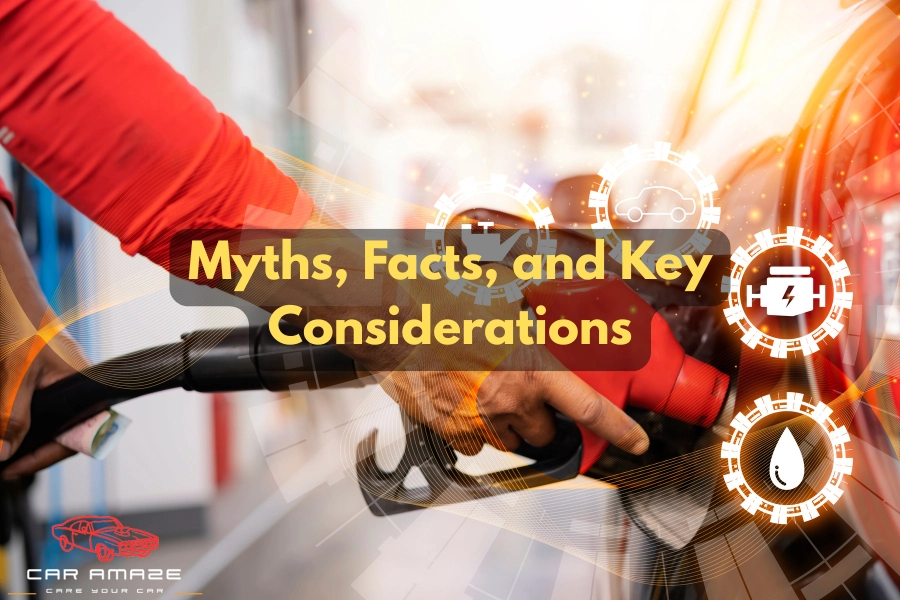
Does Premium Gas Get Better Mileage?
This is one of the common myths that putting premium gas in a car with a regular engine gives better mileage. The truth is that premium gas cannot increase mileage in regular cars. Premium has higher octane but gives the same amount of energy in regular cars.
However, the premium gas can improve mileage in high-performance and turbo cars that require a higher octane level. These cars can run more efficiently on premium. So the points to note down are
- For regular cars: No benefit of premium gas.
- For high-performance and turbo cars: Improvement in performance and economy.
When Should You Use Premium Gas?
So, you might be thinking about when you should use premium gas. Here is when it really matters:
- Turbocharged or supercharged engines: These have higher pressure and need higher octane fuel.
- Luxury or sports cars: Many premium vehicles are built with high-performance engines.
- Engines that knock or ping: Premium fuel can stop knocking and protect your engine.
- Manufacturer recommendation: If your car’s manual says “Premium required,” always use it.
Does Premium Gas Clean Your Engine Better?
Another common myth is that premium gas cleans the engine better than regular gas. In reality, it is not true anymore. Nowadays, fuels with all octane ratings have cleaning detergents and additives. No matter which octane rating you use, the gas will keep fuel injectors and valves clean.
In short, premium fuel does not clean the engine. If you want to keep the engine clean, prefer top-tier gasoline brands. Choose gas brands that use stronger and cleaner formulas in all grades.
Pros and Cons of Using Premium Gas
Here’s a list of the pros and cons of premium gas:
Pros:
- Prevents knocking in high-compression engines
- Needed for turbo or luxury cars
- Can slightly improve performance in premium-required engines
Cons:
- More expensive (20–60 cents more per gallon)
- No benefit for regular cars
- Can reduce efficiency slightly in non-premium engines
How to Check What Gas to Put in Your Regular Car
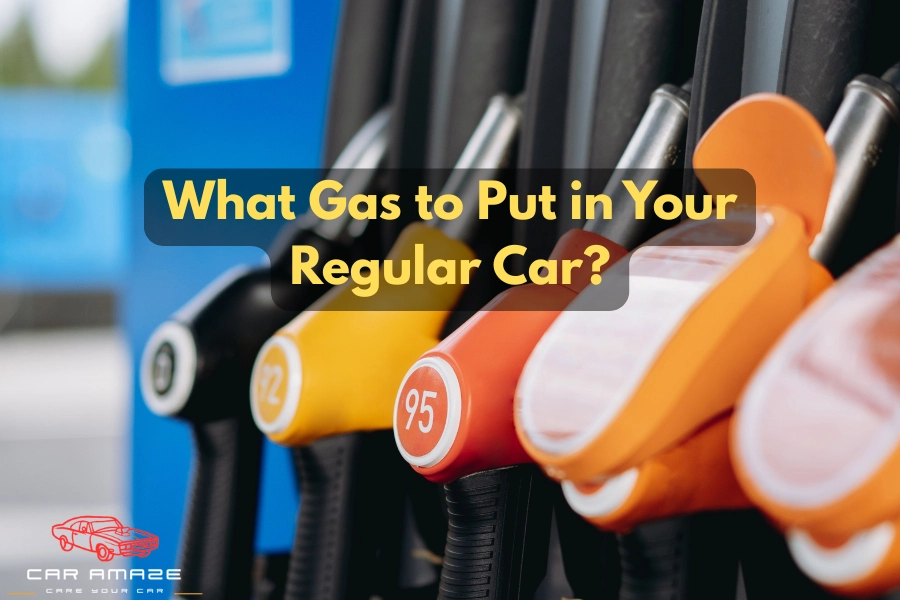
Here are some ways to find out whether you can put premium gas in your regular car or not:
- Open the owner’s manual and check if it is written which gas to use.
- Look near your gas cap. Most cars have a sticker that tells you which gas to put in the car.
- Check your car model online. You can easily find online whether to put premium gas in a car with a regular engine or not.
Expert Tip: When in Doubt, Follow the Manual
The owner’s manual of your car gives the clearest and most accurate information. Here are some things to check out:
- Regular unleaded only: Use regular gas only; premium is not needed.
- Premium recommended: You can use regular sometimes, but premium helps performance.
- Premium required: Always use premium to avoid engine damage.
The car manual gives more accurate information than myths and advertising.
Conclusion
So, can you put premium gas in your car? In short, yes, you can, but it’s not always worth it. The premium gas is only necessary for cars with high performance and turbo engines. For cars with regular engines, using premium gas will not provide any benefits. Only use that fuel with that octane number for which your car engine is designed.
FAQs
Can I put premium gas in my regular car?
Yes, you can. It is safe but unnecessary. Your car would not run faster or smoother. You will just pay more for premium gas with no extra benefit.
Can I mix premium and regular gas?
Yes. Mixing fuels is safe, and your engine will adjust automatically. It will simply use the average octane level between the two.
Does premium gas get better mileage?
Premium gas gives better mileage only in cars that require it. For regular cars, it does not improve fuel economy or power.
What happens if I use regular gas in a premium car?
Using regular fuel in a premium or high-performance car can cause engine knocking or reduced performance.
Is premium gas better for cleaning the engine?
No. All modern fuels contain cleaning additives and keep the engine as clean as possible. Premium fuel cannot clean better, but it can resist knocking.

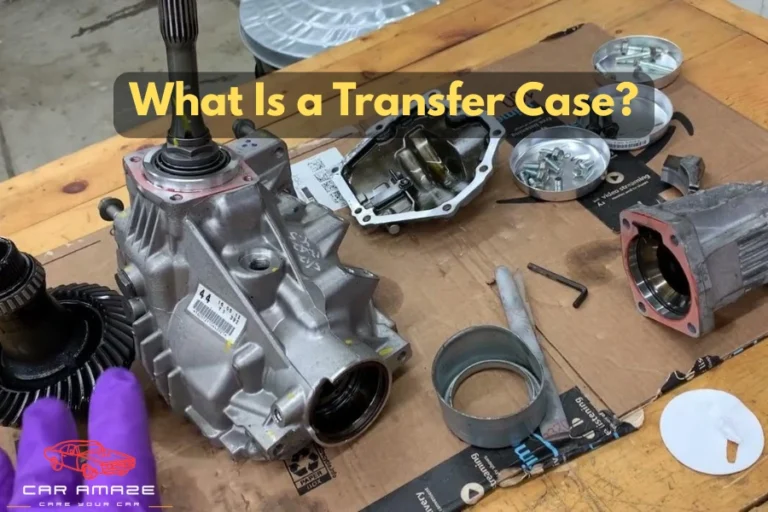




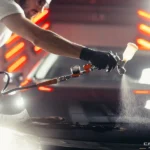

Whoa! This blog looks just like my old one! It’s on a totally different topic but it has pretty much the same layout and design. Great choice of colors!
Thanks Hannah so much for your comment! I’m glad you like the design and colors. While the topic is different, it’s great to hear that the layout feels familiar! I hope you find the information about premium gas helpful.